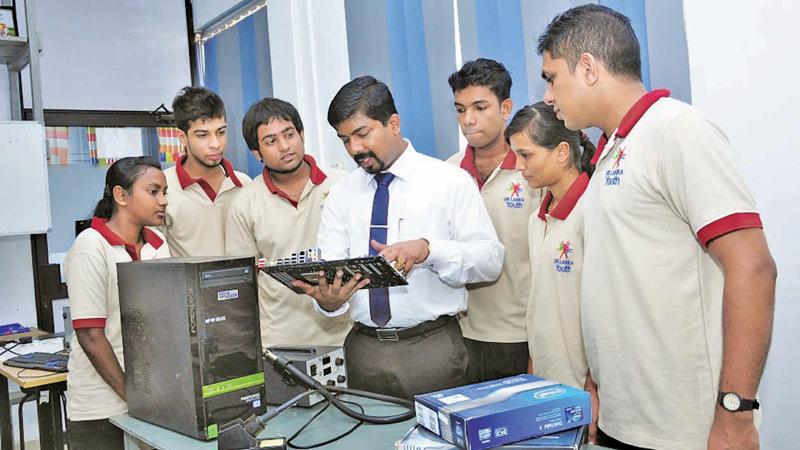
“Take a job that you love. You will jump out of bed in the morning,” says Warren Buffet, but not all the people in the world have the opportunity to find the job of their dreams. There are people living in developing countries like Sri Lanka who struggle to find a job.
Hundreds of forums that focus on unemployment, especially, youth unemployment summits are organized every year all over the country. The strategy highlighted in these events is not new. They say more training, education and youth entrepreneurship is needed to cut the youth unemployment rate.
On the other hand, youth has a lot of potential that need to be discovered and used. Training and education benefit them when they find work.
Non-formal learning
Economists today are talking about the importance of non-formal education and its role in responding to youth unemployment because it supports development by helping to transform young people’s potential, creativity, and social responsibility. This is done through the acquisition of knowledge, skills, attitudes and values, often outside formal institutional contexts.
Registered youth organisations, whether Government or NGO sponsored could play a key role in reaching out to the youth. These organisations can support re-integration through public and private sector authorities. Also, due to their youth-friendly outreach and ability to instil trust in young people, they can offer help to get in touch with suitable job-oriented courses conducted by private or public institutions. They could also provide individual support on occupational orientation and counselling.
The purpose of youth organisations is not to provide jobs but engagement in the wide variety of technical, managerial and social development activities they recommend, helping young people to develop knowledge, skills, and attitudes frequently needed in the labour market, including teamwork, communication, leadership, flexibility, and creativity. When the training is completed, the youths would be able to define their problems, coming up with ways of dealing with them, and sticking to a chosen course of action.
Hence, youth organisations contribute to close the gap between competency and the needs of the labour market.
Concerted action
Although its value is recognised at policy levels, non-formal learning is not widely understood in Sri Lanka. This situation needs to be redressed by a concerted effort of social partners, and stakeholders.
Systematic and concerted action is required to enhance the creative capacities of young people in ways that are relevant to employability.
The following are some recommendations.
It is essential to increase the recognition and validation of non-formal learning in the business and the education sectors. This would help providers, young people and potential employers to appreciate the learning and the development. The competences gained should not be limited to the so called ‘soft’ skills, but also extend to innovation and creativity.
Non-formal education providers play a crucial ‘catalytic’ role, especially with young people who are disadvantaged and hard to reach. There is a need to enhance the capacity of these providers to promote innovation and creativity in the young.
Youth organisations must ensure that all young people have a concrete entrepreneurial experience before leaving informal education. With a focus on entrepreneurship, youth organisations can play a greater role in connecting young people with the local business community, including social enterprises, thus enhancing their opportunities to find a job, or to start their own project.
Improving partnership working and cross-sector innovation
It is necessary to bring together representatives of the public, private and voluntary sectors, including employer organizations, large, medium and small companies, young people and youth organizations, to raise awareness on the benefits of non-formal learning. To achieve cooperation between stakeholders and the social partners, there is a need to incentivise all stakeholders.
Partners should pay particular attention to reach out to the disadvantaged and unskilled young adults at local, municipal and regional levels.
Youth entrepreneurship
Youth entrepreneurship is important to address unemployment. Young people are more likely to prefer self-employment than the adults, though their rate of self-employment is much less.
Entrepreneurial skills training provides the basics of starting and operating a small business.
This would help the youth to develop the skills associated with entrepreneurship, such as the ability to take the initiative, identify business opportunities, develop budgets and forecast resource needs, understand various options for acquiring capital and the trade-offs associated with each option, and communicate effectively and market oneself and one’s ideas.
Examples of approaches to teaching youth entrepreneurial skills include:
Entrepreneurship education: Provides an introduction to the values and basics of starting and running a business, such as developing a business plan and simulations of business start-up and operation.
Enterprise development: Provides support and services that help youth develop their own businesses, such as access to small loans and providing individualized attention to the development of viable business ideas.
Experiential programs: Provide youth with experience in the day-to-day operation of a business.
As millions of youth in Sri Lanka continue to struggle to connect to the economy, non-formal education offers them a chance to learn the skills and mindset needed to thrive in today’s economy.
They often encounter barriers to education and employment, and if the Government and the private sector can offer these programs, it could be a solution to the challenges they face.
